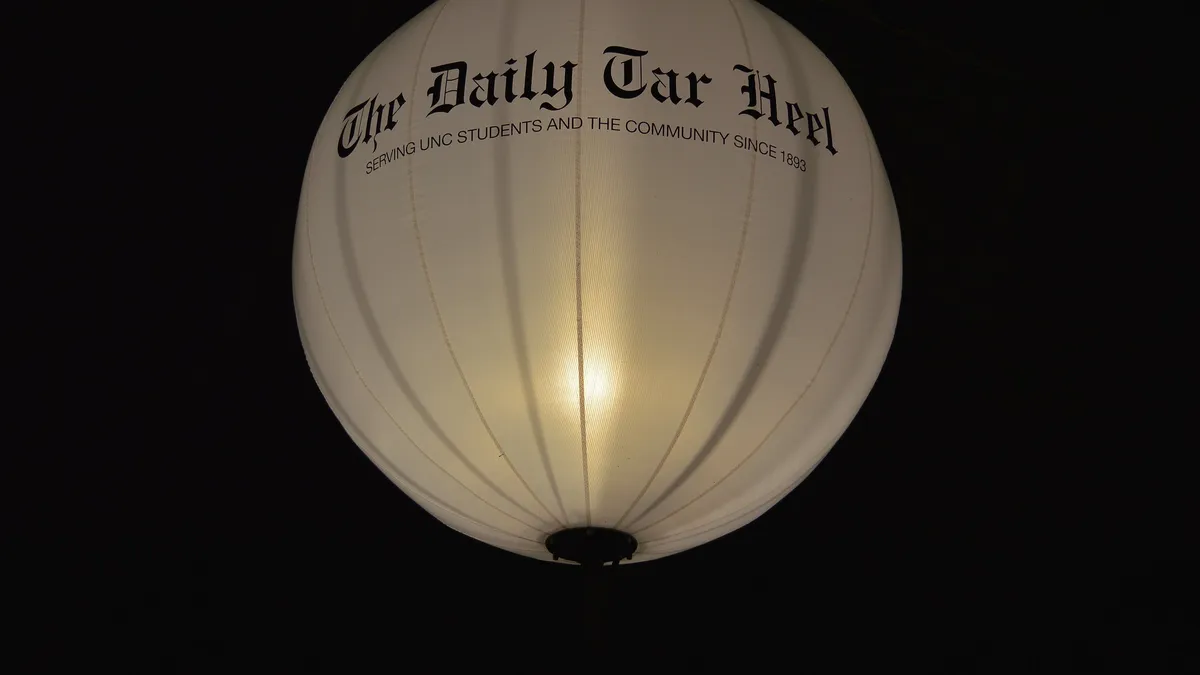It was a real "clusterfuck."
That's how The Daily Tar Heel's student journalists described the start of their academic year at the University of North Carolina at Chapel Hill.
And they weren't wrong, technically speaking. In the first week of classes, several coronavirus clusters — defined as five or more cases in proximity — emerged in campus housing.
In an editorial headlined with that cutting wordplay, the newspaper chided administrators for ignoring local health officials' guidance to start classes online, and instead reopening in-person.
Student partygoers "are not faultless," the journalists wrote, but "it was the University's responsibility to disincentivize such gatherings by reconsidering its plans to operate in-person earlier on."
One week after the academic year began and a day after the editorial went live on the publication's website, UNC-Chapel Hill announced it was moving classes back online.
The Daily Tar Heel covered that, too.
Student journalists nationwide are chronicling their institutions' handling of the pandemic while they live it. Those at The Daily Tar Heel weren't the only ones to rebuke administrators for choices they thought were reckless. Students covering the University of Notre Dame and neighboring institutions were similarly blunt: "Don't make us write obituaries," they wrote.
The new community newspaper
As local news publications cut back on coverage, student newspapers are expanding their focus to the surrounding community, said Chuck Clark, director of student publications at Western Kentucky University. It's a trend spurred by corporate austerity and one that the pandemic is compounding.
"The students realize that if they're not asking certain questions and pushing for information, nobody will," he said.
The Daily Tar Heel is emblematic of this trend. A sample of its coverage shows the storied publication's muscle applied to recent developments:
- It obtained documents revealing health professionals warned the university about the risks of reopening campus this fall.
- It broke news about campus coronavirus clusters and pressed administrators to share more details about the scale of the outbreaks.
- And it is tracking reported campus cases with an interactive map.
The publication, with other North Carolina media groups, also succeeded this spring in getting the university to release details about findings of sexual assault among students, following a four-year-long legal battle.
"It really was the tenacity of that newsroom, and generation after generation of student editor, that kept that case going," said Frank LoMonte, director of the Brechner Center for Freedom of Information at the University of Florida.
Shifting business models
The Daily Tar Heel, like its peers, is undertaking this work while its staff is widely dispersed. That change strengthened their coverage of the crisis, said Anna Pogarcic, the publication's editor-in-chief.
And it validated a shifting business model. The paper had to cut more than a dozen print issues this spring, covering some of its best advertising months. But a pre-pandemic emphasis on fundraising helped the publication to a historic year in that revenue category, said Erica Beshears Perel, its full-time general manager.
In that way, The Daily Tar Heel is different from many other college newspapers. It is a financially independent nonprofit with an off-campus office and a small support staff, including Beshears Perel, whose job includes writing grant proposals for foundation support.
Student publications, like professional media, are feeling the squeeze from dwindling advertising revenue. The Daily Tar Heel is among those embracing new income sources, including fundraising, and the pandemic could help others follow their lead by turning readers' attention to the need for reliable and robust coverage of college campuses.
"COVID has made the case for the irreplaceability of student media, better than the students could have ever made it themselves," LoMonte said.
The Daily Tar Heel's uncensored headline, which caught national attention, is one example. Sure, some people bristled at the word choice, Pogarcic said, but many more who reached out supported the decision. The publication also saw a "significant uptick" in donations that week as part of an ongoing fundraising campaign, Beshears Perel said in an email.
Education Dive spoke with Pogarcic as the fall term was winding down and the paper was renewing focus on topics other than the coronavirus, including sexual assault, the dispute over a Confederate statue on campus, student well-being and sports.
"We definitely have to remind ourselves there are other things out there besides COVID," she said.




 Read more
Read more








